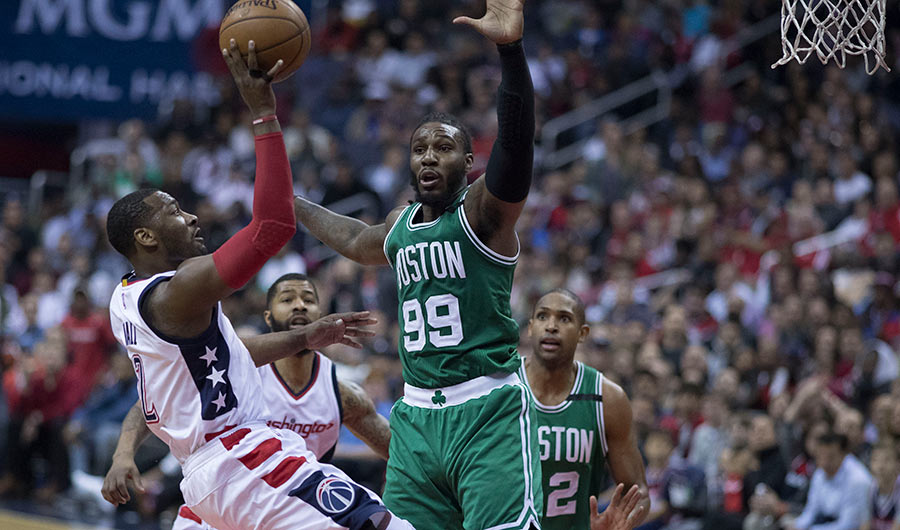Resting Healthy NBA Players During the Season May Not Help Them in Playoffs

John Wall of the Washington Wizards shoots in a playoff game against the Boston Celtics on May 12, 2017.
Keith Allison via Flickr
(Inside Science) -- Last March, the seemingly invincible Golden State Warriors looked mortal. One of their superstars, Kevin Durant, was out with a knee injury, and the team had lost four of six games.
Citing the need for rest, head coach Steve Kerr sat his healthy star players for a much-anticipated matchup with the San Antonio Spurs. The Warriors lost that game, but their refreshed squad won the next 14. On their way to a championship, they won 16 of 17 playoff games. The rest, it would seem, helped.
As the new NBA season tips off this week, the increasingly common strategy to rest star players continues to be controversial. Teams are realizing that rest could extend careers and keep players healthy and fresh for the playoffs. But television networks and the league take a big financial hit when marquee players sit. Fans lose out, too.
This year, to address the problem, the league scheduled more days between games and fewer back-to-backs. Last month, NBA commissioner Adam Silver said the league would fine teams for resting players.
And, it turns out, the benefits of resting may not be so clear-cut. A new study in the Orthopaedic Journal of Sports Medicine suggests that rest does not seem to improve performance or prevent injuries come playoff time. But there are some caveats.
The researchers, from Colorado and New Jersey, analyzed player statistics such as scoring average and Player Efficiency Rating, a number that encapsulates a player's overall performance, between 2005 and 2015. Box scores indicate whether a player missed games due to injury or rest. Considering only players who played at least 20 minutes a game, didn't change teams midseason, didn't miss more than 10 games for rest or suspension, and hadn't missed more than 20 games for any other reason, the researchers split the cohort into two groups. One group included players who rested fewer than five games and the other consisted of players who rested five to nine games.
The researchers compared players from the rested group to players from the less-rested group of similar ages, positions, minutes played, Player Efficiency Rating and team success. This way, they're not comparing a superstar like LeBron James with a mediocre player.
They found that the numbers for rested players were statistically the same as those for less-rested players. And players from both groups hardly missed any playoff games due to injury. Resting, at least for the playoffs, didn't seem to matter.
"I'm very confident that rest in the regular season doesn't affect injury risk in the playoffs or performance in that season," said Wilson Belk, an undergraduate at the University of Colorado and the study's lead author.
Still, he said, a lot of confounding and limiting factors may come into play. For example, despite a total of 811 qualifying players, there were only 27 apples-to-apples comparisons. The study also didn't take into account when the players rested. "If you rest all your games right before the playoffs, or one game per 12 games, that could make a difference," Belk said.
Incorporating other metrics to gauge player performance -- such as data that better incorporates defense, overall team performance, and opponent strength -- could also improve the analysis, said Dean Oliver, author of Basketball on Paper and former analyst at ESPN, the Sacramento Kings and the Seattle Sonics, in an email.
But different metrics may not matter anyway. "I'd be surprised if you got substantially different results," said Philip Maymin, a sports analytics expert at the University of Bridgeport in Connecticut who has consulted for NBA teams. "It's a nice intuitive result. Resting doesn't make you a better player. It just prevents you from being a worse player."
And it makes sense that playoff performance isn't affected, Maymin said. Although research and stat geeks have shown that rest does help a player maintain performance, the benefits are short-term. Resting today keeps you fresh for tomorrow -- but not for a playoff game a couple months later.
The bigger reason to rest, however, is to prevent injuries, Maymin said, and in this case, he's more skeptical. Because the researchers only consider players who play in the playoffs, they may be neglecting those who missed the playoffs because they got hurt during the regular season. The analysis would've thus ignored players who did not rest and, perhaps as a result, got injured and subsequently missed playoff games. What you need, he said, is a way to determine a player's susceptibility for injury. (Researchers have ideas.)
Previous studies and analyses suggest the NBA's packed schedule and intense travel exacerbate fatigue and injuries. So taking a game off during a long road trip could conceivably avoid a serious injury that would've kept a player out of the playoffs.
"In general, it's OK to put out there that rest might not help, but this is just one study that should probably be done a few different ways," Oliver wrote. "That isn't going to stop LeBron James from asking for rest every so often. Nor will it stop the Cavs from giving it to him."

